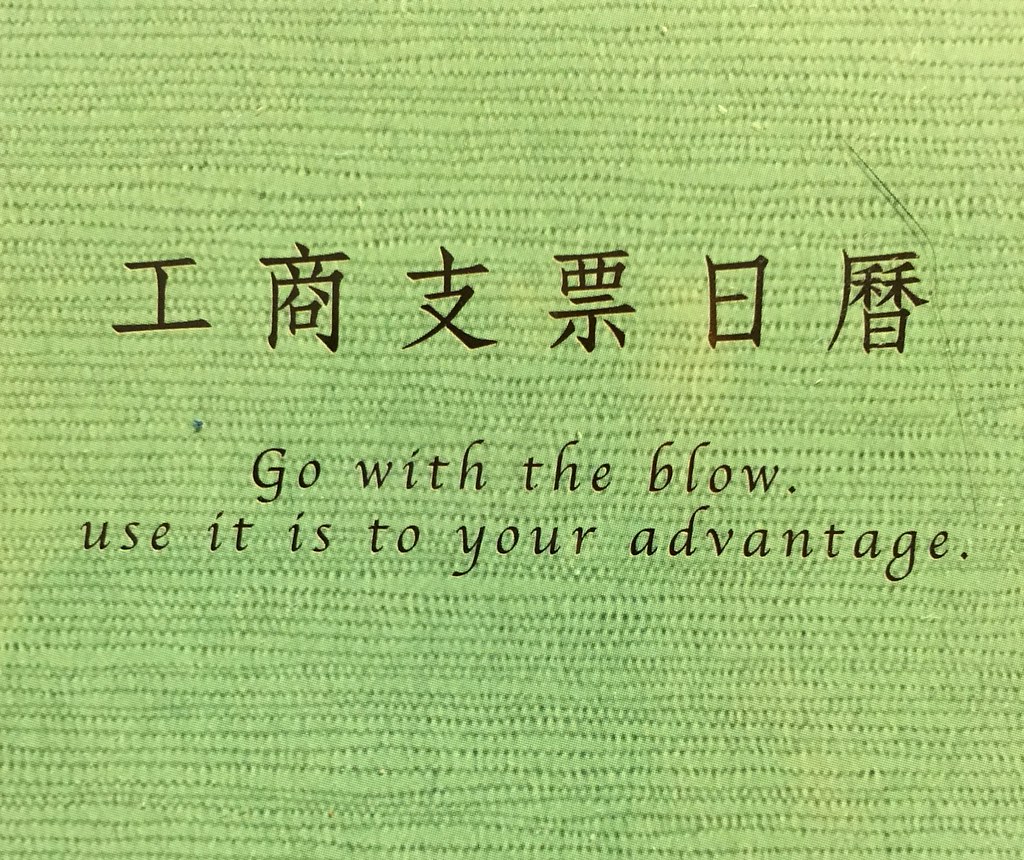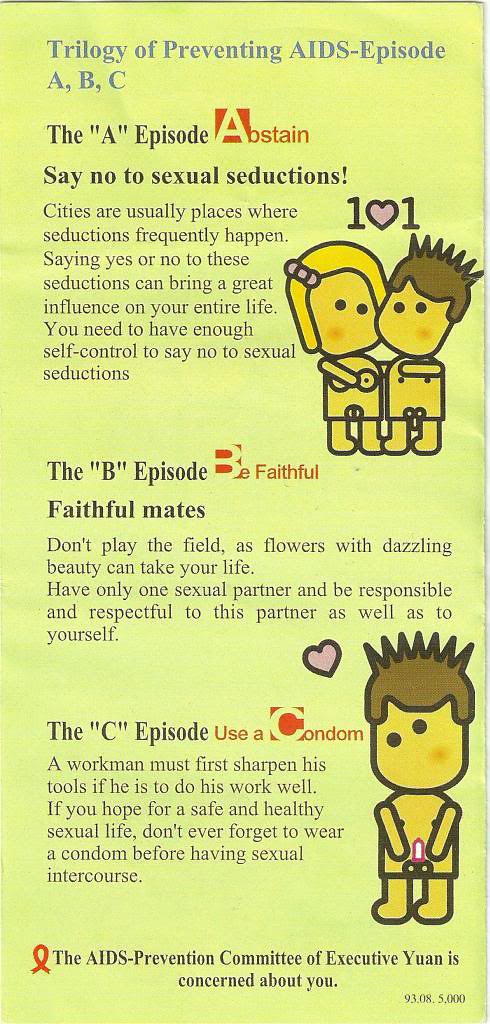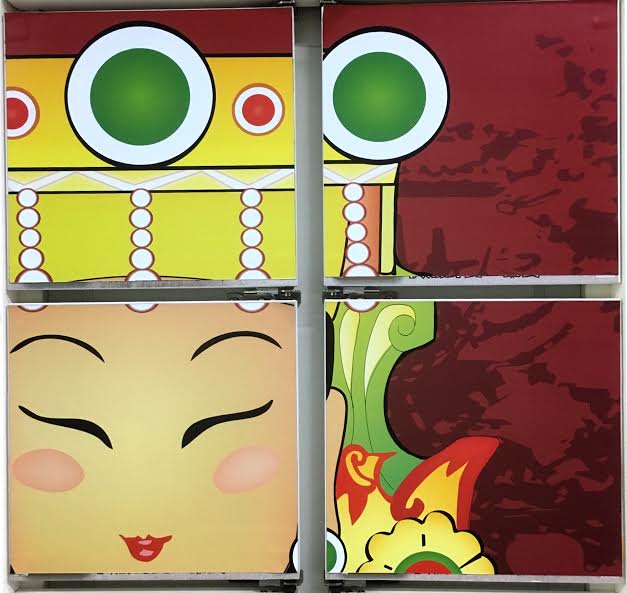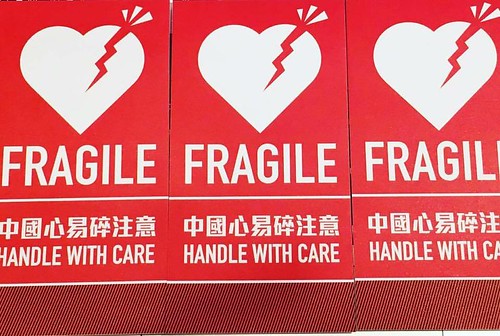I didn't understand Western Armenian then, and I don't now. To me, it sounded like a series of guttural scrapes and growls strung together with something that was not quite Russian but also not quite Turkish (I later learned that it was on a completely different branch from Russian, and not related at all to Turkish - it just had a lot of Turkish borrowings given our family's Anatolian history).
One by one, those messengers from the Old Country died, including the last person from the generation that survived the genocide. Only my grandfather and great aunt (whom I haven't seen since 2000) were left. And then my grandfather recently passed away as well.
Grandpa didn't just not teach his children Armenian, he actively refused to do so. We were close and I loved him dearly, but that is the truth. When he moved to America he made himself as American as he could possibly be, and that included speaking English and having children who spoke it too. He didn't even like talking about his early years in Athens. He did such a good job that you wouldn't have known English wasn't his first - or even his second - language unless he told you, which he wasn't likely to do.
I never understood what it was I'd lost by not learning Armenian until I went to Turkey (and later to Armenia), passing through the ancestral hometowns of both my great grandfather and grandmother in the deep south, around Tarsus and Hatay. I lost a connection to the Armenians still there, only some of whom spoke English. I lost all of the details of the stories I'd learned as a child - about the genocide, the resistance on Musa Dagh, all the personal bits. Not just the cultural stories, but the personal details that involved my actual relatives. My grandpa didn't like talking about it, and my great grandmother died before I cultivated an interest (and there was a language barrier, as well). The stone engravings on the Armenian church in Vakifli. The old songs, which I could understand translations of but not really understand.
I come back to this thought periodically as I have experiences in Taiwan. The friend who couldn't really converse with her grandmother, because she'd never learned Hakka. The students who all spoke Taiwanese natively, but who were not actively teaching it to their children (and, as a result, the children were not learning it). Reading Rose Rose I Love You, and not getting all the jokes because I was reading it in a language other than the one it was written in. The translator did an excellent job explaining all of the wordplay, referencing and language-based jokes, but it wasn't the same as natively just "getting it". I imagine that if I see Tshiong in theaters, which I am planning to do, I'll feel similarly.
This mirrors my entire relationship to Taiwan. I have lived here for some time, but a lot of the references and in-jokes have to be explained to me. I don't speak Taiwanese natively and never will (even if I come to speak it well, which frankly is also unlikely), so I'll never just get it on a molecular level.
Imagine my disappointment, then, when I read this, um, questionable editorial in the News Lens about "letting Hakka go". Perhaps Eryk Smith is a "member of the tribe" by marriage - sure, fine - although I did wonder why, then, he'd reference lei cha as something Hakka. Every Hakka I know points to it as an invention for tourists. In any case, I'm not sure being married to a Hakka quite gives one enough credentials to speak for all Hakka people.
Anyway, that doesn't matter much. What does matter is that every point he makes goes against everything I know as a child of the Armenian diaspora and also as a kinda-sorta off-brand linguist.
There are some arguments in favor of cutting off the funding allocated to preserving Hakka - as a friend pointed out on Facebook:
The Hakka community gets a disproportionate amount of budget because they are traditionally “Blue” and a swing vote in many areas of Taiwan, which is why there’s budget for “we love Hakka” on ICRT, but not something actually useful to the foreign community like “we love Hoklo”.
“Let it die” is too strong. Change it to “lose the pork” and I’m on board.
I agree - it doesn't need all the pork it gets (for the wrong reasons). But that doesn't mean we shouldn't preserve it. Do you know what doesn't cost a lot of money? Early childhood immersion programs and, later on, CLIL (content and language integrated learning). The curricula for these already exist - it's the courses students already take. They'd just be taught in Hakka. And what does that produce? Native speakers of Hakka who also have other native languages such as Mandarin, Taiwanese or even English.
In any case, saying it's fine not to pass on language as cultural heritage hurts to read - down to the cells, it hurts - because I am a product of that "who cares, it's a bad investment, let it die" attitude to language learning, and it was to my detriment.
First of all, any sociolinguist or even TESOL specialist (I can call myself the latter, perhaps not the former) will tell you that culture and language are linked, though not always inextricably so. If you lose a language, you lose something intangible but real and irretrievable about its culture. As Kumaravadivelu notes of Wierzbicka in Cultural Globalization and Language Education, "Culture-specific words...are conceptual tools that reflect a society's past experience of doing and thinking about things in certain ways; and they may help to perpetuate these ways."
While Wierzbicka goes on to say that these tools may be "modified or discarded" and do not make up the sum of a cultural or social outlook, there is a clear connection.
While this ability to adapt and discard may be true of Taiwanese society as a whole, by losing these words, we lose a sense of conception and culture unique to Hakka society, just as my family has lost its ability to relate to certain Armenian cultural concepts - and just as I was never given the chance to gain it.
Simply put, you cannot teach "cultural history" and "stories" in any language you like - or rather, you can, but you inevitably lose something. By teaching Hakka stories in Taiwanese, Mandarin or English, you lose some ways of thinking about these stories unique to Hakka. You lose what makes them whole. What you have is just a story on paper, from a culture you no longer know natively. You lose the textures, the cadences, the topography of cultural heritage - the things that make old stories alive, relevant and linked to who you are. Lin Shao-mao is a character in a story in Mandarin, Taiwanese or English. He's typed up. Flat on a page. Black-on-white, maybe with some pictures. He's a part of who you are as a people in Hakka.
In English, The Forty Days of Musa Dagh - a part of my cultural heritage - is a book I can read. It means something, but it lacks psychological topography. This hymn in Armenian (this is a video I took earlier this year in a monastery outside Yerevan) is beautiful, but because I can't understand it in any way, it lacks certain textures that I might have otherwise understood. Natively.
As language preservationists will also point out, the value of preserving a language is not in how "useful" it is, or the return on investment it provides, but in retaining that connection, those ideas from the past that cannot be fully rendered in another language. You don't save a language based on how many people speak it, you save it for the unique knowledge it contains. Not everybody has a capitalist view of language learning, in which only the languages with the highest ROI are learned - some people are after something a little more thoughtful and a little less cold.
I mean, I didn't marry Brendan because he was "a good investment" (although I could argue that he was, depending on how you define "investment"). I married him because I love him. I don't try to pick up Taiwanese because it's a good investment. I do it because I love Taiwan. Sometimes you do things simply because you love them.
In any case, is it not a good investment to understand the cultural connections inherent in the language of your ancestors, that no other language can fully convey? Someday, I'd like to learn Western Armenian. It's a terrible "investment" in terms of usefulness, compared to Chinese, Arabic, Spanish or even Turkish - but it's a great investment if I want to fully understand some of the intangibles of my heritage.
And, as language teachers will point out, there is a way to ensure that Hakka continues to exist without putting older children and young adults through pointless language classes: learning it natively. Although there is a lot to be criticized about the "critical period hypothesis", as Lightbown and Spada point out in How Languages Are Learned, they and others do acknowledge that research has not yet found a limit to the number of languages one can learn natively. If that government budget were spent ensuring that very young children learned Hakka as a first language, alongside Mandarin and perhaps Taiwanese (and perhaps even English), it wouldn't be a drain on young people's time. It would just come naturally.
There is truly no need to argue about this - although leave it to the Taiwanese government to screw up language education - language teaching theory has more or less settled it. It is no longer one of the Great Questions.
Finally, as I hope Eryk Smith surely knows, if some people pick up "a working knowledge" of Hakka from their grandparents, but then do not teach it to their children, Hakka won't continue to be a minority language. Nobody is trying to make Hakka the primary language of Taiwan - that will never happen. It won't exist at all, however, if nobody teaches it to their children.
And then we'll have lost something indeed. I wonder how many great-grandchildren who never learned Hakka will make the trip back to Miaoli or Meinong or Beipu or even Yangmei, just as I did on Musa Dagh, and sigh not only at what they'd lost, but what their short-sighted ancestors never allowed them to gain.
Grandpa didn't just not teach his children Armenian, he actively refused to do so. We were close and I loved him dearly, but that is the truth. When he moved to America he made himself as American as he could possibly be, and that included speaking English and having children who spoke it too. He didn't even like talking about his early years in Athens. He did such a good job that you wouldn't have known English wasn't his first - or even his second - language unless he told you, which he wasn't likely to do.
I never understood what it was I'd lost by not learning Armenian until I went to Turkey (and later to Armenia), passing through the ancestral hometowns of both my great grandfather and grandmother in the deep south, around Tarsus and Hatay. I lost a connection to the Armenians still there, only some of whom spoke English. I lost all of the details of the stories I'd learned as a child - about the genocide, the resistance on Musa Dagh, all the personal bits. Not just the cultural stories, but the personal details that involved my actual relatives. My grandpa didn't like talking about it, and my great grandmother died before I cultivated an interest (and there was a language barrier, as well). The stone engravings on the Armenian church in Vakifli. The old songs, which I could understand translations of but not really understand.
I come back to this thought periodically as I have experiences in Taiwan. The friend who couldn't really converse with her grandmother, because she'd never learned Hakka. The students who all spoke Taiwanese natively, but who were not actively teaching it to their children (and, as a result, the children were not learning it). Reading Rose Rose I Love You, and not getting all the jokes because I was reading it in a language other than the one it was written in. The translator did an excellent job explaining all of the wordplay, referencing and language-based jokes, but it wasn't the same as natively just "getting it". I imagine that if I see Tshiong in theaters, which I am planning to do, I'll feel similarly.
This mirrors my entire relationship to Taiwan. I have lived here for some time, but a lot of the references and in-jokes have to be explained to me. I don't speak Taiwanese natively and never will (even if I come to speak it well, which frankly is also unlikely), so I'll never just get it on a molecular level.
Imagine my disappointment, then, when I read this, um, questionable editorial in the News Lens about "letting Hakka go". Perhaps Eryk Smith is a "member of the tribe" by marriage - sure, fine - although I did wonder why, then, he'd reference lei cha as something Hakka. Every Hakka I know points to it as an invention for tourists. In any case, I'm not sure being married to a Hakka quite gives one enough credentials to speak for all Hakka people.
Anyway, that doesn't matter much. What does matter is that every point he makes goes against everything I know as a child of the Armenian diaspora and also as a kinda-sorta off-brand linguist.
There are some arguments in favor of cutting off the funding allocated to preserving Hakka - as a friend pointed out on Facebook:
The Hakka community gets a disproportionate amount of budget because they are traditionally “Blue” and a swing vote in many areas of Taiwan, which is why there’s budget for “we love Hakka” on ICRT, but not something actually useful to the foreign community like “we love Hoklo”.
“Let it die” is too strong. Change it to “lose the pork” and I’m on board.
I agree - it doesn't need all the pork it gets (for the wrong reasons). But that doesn't mean we shouldn't preserve it. Do you know what doesn't cost a lot of money? Early childhood immersion programs and, later on, CLIL (content and language integrated learning). The curricula for these already exist - it's the courses students already take. They'd just be taught in Hakka. And what does that produce? Native speakers of Hakka who also have other native languages such as Mandarin, Taiwanese or even English.
In any case, saying it's fine not to pass on language as cultural heritage hurts to read - down to the cells, it hurts - because I am a product of that "who cares, it's a bad investment, let it die" attitude to language learning, and it was to my detriment.
First of all, any sociolinguist or even TESOL specialist (I can call myself the latter, perhaps not the former) will tell you that culture and language are linked, though not always inextricably so. If you lose a language, you lose something intangible but real and irretrievable about its culture. As Kumaravadivelu notes of Wierzbicka in Cultural Globalization and Language Education, "Culture-specific words...are conceptual tools that reflect a society's past experience of doing and thinking about things in certain ways; and they may help to perpetuate these ways."
While Wierzbicka goes on to say that these tools may be "modified or discarded" and do not make up the sum of a cultural or social outlook, there is a clear connection.
While this ability to adapt and discard may be true of Taiwanese society as a whole, by losing these words, we lose a sense of conception and culture unique to Hakka society, just as my family has lost its ability to relate to certain Armenian cultural concepts - and just as I was never given the chance to gain it.
Simply put, you cannot teach "cultural history" and "stories" in any language you like - or rather, you can, but you inevitably lose something. By teaching Hakka stories in Taiwanese, Mandarin or English, you lose some ways of thinking about these stories unique to Hakka. You lose what makes them whole. What you have is just a story on paper, from a culture you no longer know natively. You lose the textures, the cadences, the topography of cultural heritage - the things that make old stories alive, relevant and linked to who you are. Lin Shao-mao is a character in a story in Mandarin, Taiwanese or English. He's typed up. Flat on a page. Black-on-white, maybe with some pictures. He's a part of who you are as a people in Hakka.
In English, The Forty Days of Musa Dagh - a part of my cultural heritage - is a book I can read. It means something, but it lacks psychological topography. This hymn in Armenian (this is a video I took earlier this year in a monastery outside Yerevan) is beautiful, but because I can't understand it in any way, it lacks certain textures that I might have otherwise understood. Natively.
As language preservationists will also point out, the value of preserving a language is not in how "useful" it is, or the return on investment it provides, but in retaining that connection, those ideas from the past that cannot be fully rendered in another language. You don't save a language based on how many people speak it, you save it for the unique knowledge it contains. Not everybody has a capitalist view of language learning, in which only the languages with the highest ROI are learned - some people are after something a little more thoughtful and a little less cold.
I mean, I didn't marry Brendan because he was "a good investment" (although I could argue that he was, depending on how you define "investment"). I married him because I love him. I don't try to pick up Taiwanese because it's a good investment. I do it because I love Taiwan. Sometimes you do things simply because you love them.
In any case, is it not a good investment to understand the cultural connections inherent in the language of your ancestors, that no other language can fully convey? Someday, I'd like to learn Western Armenian. It's a terrible "investment" in terms of usefulness, compared to Chinese, Arabic, Spanish or even Turkish - but it's a great investment if I want to fully understand some of the intangibles of my heritage.
And, as language teachers will point out, there is a way to ensure that Hakka continues to exist without putting older children and young adults through pointless language classes: learning it natively. Although there is a lot to be criticized about the "critical period hypothesis", as Lightbown and Spada point out in How Languages Are Learned, they and others do acknowledge that research has not yet found a limit to the number of languages one can learn natively. If that government budget were spent ensuring that very young children learned Hakka as a first language, alongside Mandarin and perhaps Taiwanese (and perhaps even English), it wouldn't be a drain on young people's time. It would just come naturally.
There is truly no need to argue about this - although leave it to the Taiwanese government to screw up language education - language teaching theory has more or less settled it. It is no longer one of the Great Questions.
Finally, as I hope Eryk Smith surely knows, if some people pick up "a working knowledge" of Hakka from their grandparents, but then do not teach it to their children, Hakka won't continue to be a minority language. Nobody is trying to make Hakka the primary language of Taiwan - that will never happen. It won't exist at all, however, if nobody teaches it to their children.
And then we'll have lost something indeed. I wonder how many great-grandchildren who never learned Hakka will make the trip back to Miaoli or Meinong or Beipu or even Yangmei, just as I did on Musa Dagh, and sigh not only at what they'd lost, but what their short-sighted ancestors never allowed them to gain.






